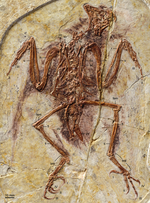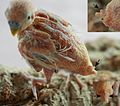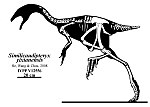Pygostyle describes a skeletal condition in which the final few caudal vertebrae are fused into a single ossification, supporting the tail feathers and...
9 KB (958 words) - 20:01, 29 April 2024
quill knobs (the anchor points for wing feathers on the forelimb) or a pygostyle (the fused vertebrae at the tail tip which often supports large feathers)...
36 KB (3,339 words) - 20:01, 26 October 2024
to the pygostyle. The Ornithothoraces have a ploughshare-shaped pygostyle, while the more primitive members had longer, rod-shaped pygostyles. The earliest...
8 KB (796 words) - 04:37, 25 June 2024
new group called Sauriurae. Said simply, modern birds have short, fused pygostyle tails, while Archaeopteryx retained the long tail characteristic of non-avian...
7 KB (573 words) - 14:45, 21 October 2024
point and ended in a pygostyle, a set of fused tail vertebrae. The only other non-avian theropod that are known to have had a pygostyle are certain oviraptorosaurs...
5 KB (548 words) - 18:28, 21 April 2024
The first element to disappear was the bony tail, being reduced to a pygostyle and the tail function taken over by feathers. Confuciusornis is an example...
28 KB (3,240 words) - 13:21, 2 July 2024
Rumpless chickens are characterised by caudal dysplasia, the absence of the pygostyle or caudal appendage – the "parson's nose". This is the result of inheritance...
4 KB (369 words) - 17:52, 7 July 2023
Bird anatomy (section Pygostyle)
adaptation is the fusing of bones into single ossifications, such as the pygostyle. Because of this, birds usually have a smaller number of bones than other...
82 KB (9,632 words) - 14:03, 29 September 2024
dorsal ribs, two sacral vertebrae, twenty-five caudal vertebrae with a pygostyle, three chevrons, an incomplete furcula and scapula, both coracoids, both...
28 KB (3,267 words) - 06:05, 7 June 2024
Caudal vertebrae compose the tail, and the final few can be fused into the pygostyle in birds, or into the coccygeal or tail bone in chimpanzees (and humans)...
43 KB (5,323 words) - 17:50, 29 September 2024
small, round pieces of dark meat are often considered to be a delicacy. Pygostyle (chicken's buttocks) and testicles: These are commonly eaten in East Asia...
37 KB (4,275 words) - 19:56, 30 October 2024
alongside a short, triangular pygostyle, like the ones in modern birds, rather than the long, rod- or dagger-shaped pygostyles in more primitive avialans...
109 KB (8,990 words) - 07:24, 13 October 2024
dorsally at the base of the tail (between the fourth caudal vertebra and the pygostyle) and is greatly variable in both shape and size. In some species, the...
17 KB (1,830 words) - 16:49, 23 September 2024
synsacrum there are a few free caudal vertebrae, the last of which is the pygostyle to which the long, stiff tail feathers are attached. The central section...
2 KB (220 words) - 21:57, 14 August 2023
have referred to as a "pygostyle", but which Witmer found was anatomically different and evolved separately from the pygostyle of birds (a bone which...
23 KB (2,428 words) - 19:22, 24 October 2024
had a tail with a tail fan of feathers with caudal anatomy resembling a pygostyle, are not known to have been capable of flight, but some scientists, such...
19 KB (2,000 words) - 07:36, 17 October 2024
(Hemicircus excepting). The inner rectrix pairs became stiffened, and the pygostyle lamina was enlarged in the ancestral lineage of true woodpeckers (Hemicircus...
76 KB (8,468 words) - 02:41, 20 September 2024
pubis (innominate); 15. ilium (innominate); 16. caudal vertebrae; 17. pygostyle; 18. synsacrum; 19. scapula; 20. dorsal vertebrae; 21. humerus; 22. ulna;...
95 KB (11,266 words) - 08:45, 28 September 2024
first toe reduced. The tail was likely not very elongated, and ended in a pygostyle that supported large feathers. The initial relationships of Oviraptor...
49 KB (5,808 words) - 18:58, 1 July 2024
vibrissae around the gape. They have 13 flight feathers, no tail and a small pygostyle. Their gizzard is weak and their caecum is long and narrow. The eye of...
63 KB (5,464 words) - 20:18, 12 September 2024
According to Döderlein the reduced tail of Anurognathus was similar to the pygostyle of modern birds. Its more typical "rhamphorhynchoid" characters include...
9 KB (1,080 words) - 18:25, 9 April 2024
the lumbar region and sacrum), six free tail (caudal) vertebrae, and a pygostyle. The neck had well-developed areas for muscle and ligament attachment...
137 KB (15,887 words) - 00:58, 28 October 2024
developed horny, toothless beaks by the very Late Jurassic and short pygostyle tails by the Early Cretaceous. While the archosaurs and dinosaurs were...
234 KB (22,717 words) - 18:26, 17 October 2024
Similicaudipteryx). Another finding pointing to this is the discovery in Nomingia of a pygostyle, a bone that results from the fusion of the last tail vertebrae and is...
23 KB (2,342 words) - 12:07, 30 January 2024
lower jaws were toothless and developed a horny beak. The tail ended in a pygostyle (the fusion of the last caudal vertebrae), which is known to support large...
39 KB (4,281 words) - 21:05, 14 September 2024
pelvic cavity. Bone terminology Ganglion impar Human vestigiality Perineum Pygostyle Weisberger, Mindy (March 23, 2024). "Why don't humans have tails? Scientists...
18 KB (1,998 words) - 03:08, 15 September 2024
maniraptoromorphs, and this process culminated in the appearance of the pygostyle, an ossification of fused tail vertebrae. In the late Cretaceous, about...
235 KB (23,457 words) - 17:46, 30 October 2024
teeth. The tail is proportionately short, has thirteen vertebrae, and no pygostyle. The third finger has only two phalangeal bones, unlike non-avian dinosaurs...
6 KB (713 words) - 08:34, 15 October 2024
Similicaudipteryx also differed from its relatives by possessing a dagger-shaped pygostyle (the bone at the end of the tail to which feathers anchor in birds) consisting...
5 KB (591 words) - 12:39, 20 January 2024
There are large vibrissae around its gape, and it has no tail, only a pygostyle. It has a length of 45 to 55 cm (18–22 in) and the female weighs 2.1 to...
11 KB (1,075 words) - 01:18, 11 August 2024


























